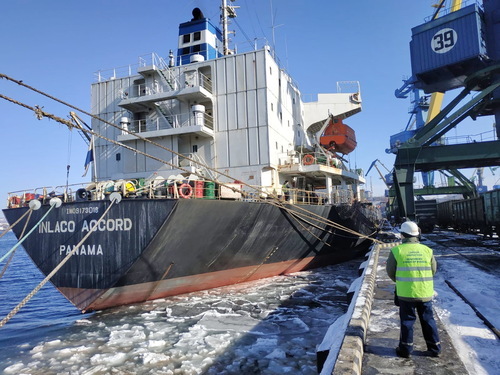ÐÎÑÑÈÉÑÊÈÉ ÏÐÎÔÅÑÑÈÎÍÀËÜÍÛÉ ÑÎÞÇ ÌÎÐßÊÎÂ
SEAFARERS' UNION OF RUSSIA
A NON-UNIONIZED SEAFARER
IS AN UNPROTECTED SEAFARER
Back
$252 — the basic wage for AB of m/v Inlaco Accord

The flag of convenience of Panama allowed the Vietnamese company Inlaco Saigon to establish such a meagre wage size. Nikolay Sukhanov, Chairman of the Far Eastern Territorial Organization of the Seafarers' Union of Russia, noted that the AB's basic wage would be much higher if there had been an ITF-approved collective agreement on board the vessel.
Today the SUR FETO Inspectors have visited m/v Inlaco Accord (IMO 9173018) berthed at the port of Nakhodka for loading metal to be shipped to the South Korean port of Pohang. Given that the access to shore leave is extremely restricted the Vietnamese crew have welcomed the visitors warmly.
According to the documents which the captain showed to the SUR representatives, the registered owner and operator of the vessel is Inlaco Saigon from Ho Chi Minh, Vietnam. This company is also a beneficial owner of this vessel, it pays the crew's salaries and takes financial responsibilities for them, including their health and life insurance.
- There was no ITF-approved collective agreement on board Inlaco Accord. The captain has showed us an agreement signed with the Vietnamese trade union, but it is not agreed with the ITF and does not meet the requirements of the federation. That's why the AB's basic wage is $252, although the International Labor Organization's recommended minimum wage rate for this position is $641. The salary of the Inlaco Accord's captain is $3,045, which does not correspond to the level of responsibility and workload of that position. The collective agreement available on board the ship does not provide the crew members with proper remuneration and legal protection, - Nikolay Sukhanov noted.
The SUR FETO Inspectors have explained the crew that if their vessel was covered by the ITF-approved collective agreement the AB' basic wage would have been $1800. Besides, in case of death of any crew member, his family would have been entitled to a compensation in the amount of at least $110,000.
– The main concern with the shipowner is the using of flag of convenience without signing an ITF-approved collective agreement with it's affiliated union organisation, – explained Nikolay Sukhanov. – When a companys fails to comply with the ITF requirements on wage levels, it is possible to transfer vessel under the national flag and run business within the framework of national legislation. Why did the Vietnamese shipowner recruit Vietnamese crew, but did not raise the Vietnamese flag on the Inlaco Accord is a question to which we know the answer. To save on crew wages.
However, if a company for some reason does not want to work under Vietnamese law, then the national seafarers' union must submit the necessary documents to ITF and agree on the signing of a collective agreement.
All things considered, the seafarers have asked the SUR FETO representatives to prepare a notice to the shipowner on a need to sign ITF collective agreement or change the flag from Panamanian to national one, thus the Vietnamese crew have supported the ITF's demand.
Finally, before leaving the vessel the SUR FETO Inspectors gave the crew of Inlaco Accord booklets in English about the rights and guarantees of seafarers working on a ship under a flag of convenience and the union's magazines "Maritime Union's Herald".
Up
